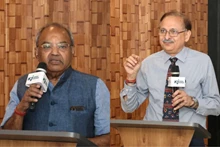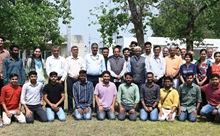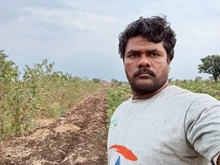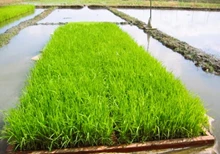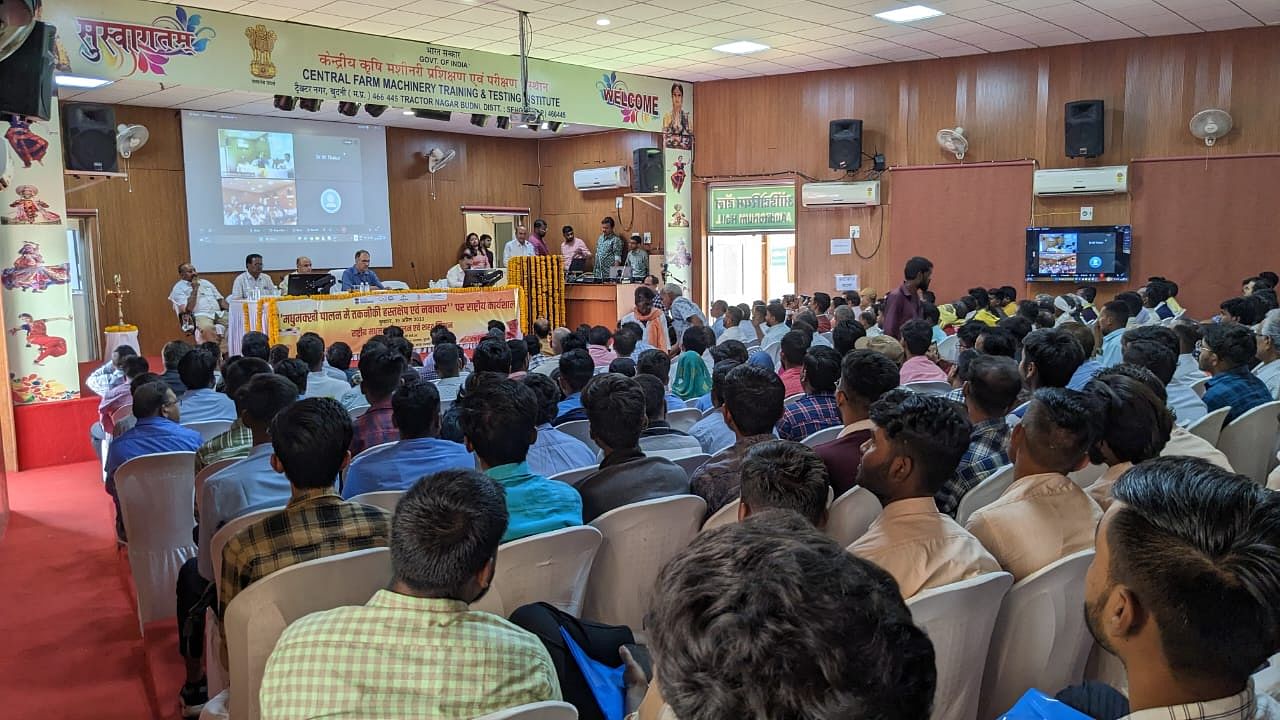
Around 500 progressive beekeepers/stakeholders, startups, entrepreneurs, state government officials, scientists from Central and State Agriculture Universities, honey processors, and others attended the programme, while more than 100 participants virtually joined the session from other parts of the nation.
Dr. Abhilaksh Likhi, Additional Secretary, DA&FW, indicated in his remarks as chairman that the honey sector will grow by adopting advanced beekeeping instruments. It is a developing agricultural sector that provides a source of income for rural, urban, and entrepreneurial populations with the least amount of investment. It is an agriculture-related technique that has the potential to boost the economy and jobs in local and farming communities.
Beekeeping is an agricultural art that necessitates scientific as well as practical exercises for proper management and collection of honey and beehive products, and the NBHM has approved and established 31 mini-testing labs and four regional labs for quality honey production in the country to avoid adulteration in honey, which aids in increasing honey and allied product exports to boost the sector. He also emphasized the NBHM's plan for GI tagging in honey, which will assist to revitalize rural areas by increasing money for producers and jobs in the region through beekeeping and honey production. The high quality of the products opens up national and worldwide opportunities for honey producers.
Earlier, Anil Upadhyaya, Director, CFMT&TI, Budni, thanked the NBHM, Ministry of Agriculture and Farmers Welfare for the opportunity to conduct this National Level workshop and focused on the farmers, beekeepers, start-ups, and FPOs of Madhya Pradesh region as this region is rich in agriculture with a large number of potential farmers and has a scope in development of beekeeping. According to him, beekeeping is a low-investment, high-efficiency business model that is developing as a springboard for technology application and socioeconomic growth.
Beekeeping can assist farmers and others improve their livelihoods by taking this approach. The Government of India has tried several measures to enhance farmer income. In this backdrop, the Government of India's Sweet Revolution effort is an ambitious initiative aimed at promoting 'Beekeeping' in order to enhance the production of quality honey and other allied goods.
Dr. N. K. Patle, Additional Commissioner (Horticulture) and Executive Director, National Bee Board (NBB), gave a brief presentation on the role and achievements of NBHM in the country, success stories of NBHM beneficiaries, opportunities for beekeepers, agri start-ups/ stakeholders under NBHM, and so on. He told the workshop attendees that technological developments in beekeeping are critical. He noted that the government has taken steps to maximise the industry's complete potential, particularly by aiding farmers, beekeepers, honey startups, and FPOs.
He went on to say that the NBHM has approved 31 Mini Testing Labs and four Regional labs to ensure the quality of honey produced in the country. The NBHM has also created the Madhukranti portal, which is a fantastic endeavour to give nationwide beekeeping statistics by registering beekeepers and other stakeholders. He stated that the NBHM is also assisting agri-entrepreneurs/startups in encouraging and starting beekeeping/honey production. He stated that the promotion and formation of FPOs is the first stage in changing Krishi into Atmanirbhar Krishi, and that the execution of the NBHM programme will bring revolutionary changes by using technologies and innovations to enhance the beekeeping industry.
He also welcomed all beekeeping stakeholders to apply for NBHM assistance and begin beekeeping and honey production both within and beyond the country. He also urged farmers, beekeepers, and other stakeholders to use the NBHM facilities and practice scientific beekeeping in order to raise income and improve the lives of farmers and beekeepers through the production and distribution of honey and other beehive products.
Yovraju A., Business Manager, MANAGE, discussed the potential of Agri Startups in the beekeeping sector and stated that this is a one-stop solution for building profitable companies in Agriculture & Allied sectors. He advocated greater work on beekeeping material, saying it should be provided in multiple regional languages to increase the scheme's reach. He proposed increased capacity-building programmes and the establishment of an ecosystem for startups and entrepreneurs in the beekeeping industry, as well as sharing success stories of firms backed by NBHM.
Manoj Patel (Bundeli Honey) and Bhavesh (Tribe Grown), both NBHM-assisted start-ups, recounted their success stories on how they grew their sales and income through the beekeeping business from a small beginning to a large enterprise.
Suman Singh Merawi, a beekeeper/farmer from Balaghat, shared his impressive journey in beekeeping and honey production and inspired the younger generation to take up this practise as a hobby and turn it into a source of income to protect agricultural heritage and contribute to the sector.
Kavita Rajput and Mekalsuta from Narmadapuram Dist. M.P.'s Shelf Help Group, who are producing raw forest honey and earning a good living from it, also shared the importance of beekeeping in environmental conservation and set an example for women that beekeeping is not only for men, but a woman can also make it her source of livelihood.
Dr. Manoj Ahirwar, Scientist, Krishi Vigyan Kendra, Damoh, JNKVV, M.P, gave a presentation on technological interventions for crop yield enhancement in agricultural/horticultural crops utilising sophisticated beekeeping instruments. We can significantly enhance honey output and horticulture production by employing better beehive technologies. Beekeepers must be motivated to embrace or continue to utilise the technology since the return on investment, i.e. increased production, is realised.
Because the adoption of improved beehive technology has multiplier effects ranging from increased beekeeping productivity to economic growth and poverty reduction, the development of Bee Breeders for the enhancement of the beekeeping sector can be achieved by recognizing desirable characteristics among honeybee varieties and implementing systematic and planned activities aimed at the long-term genetic improvement of the honey bee population. Dr Pramod Mall, Principal Scientist at GB Pant University in Pantnagar (Uttarakhand), emphasized the development of a quality nucleus stock centre as an important practice for improving and increasing honey output.
Dr. R.K. Thakur, Retd. Professor, Dr. Y. S. Parmar University, emphasized the significance and specifications of Honey Bee Disease & Diagnostic Centres, which may aid in the inspection for bee diseases, an important element of beekeeping. Apiary inspectors and beekeepers must be able to identify bee diseases and parasites and distinguish between major and minor ailments. The goals of Honey Bee Disease & Diagnostic Centres are to preserve and deliver quality bees for beekeeper safety, identify parasites, pests, and other abnormalities of the honey bee utilizing laboratory techniques used to diagnosis illnesses, and protect and boost honey output.
Hriday Darji, Scientist, NDDB, spoke about "Honey Testing Labs for Basic Parameters in Honey Testing" and how the latest interventions are being implemented to produce high-quality honey in large quantities in order to help our beekeepers by avoiding adulteration in honey and increasing honey sales and exports.
Rajeev Paliwal of CFMT&TI gave the vote of thanks to all the delegates and stakeholders for sharing and deliberating informative knowledge among all, which may help the NBHM to come forward and join hands with the State Horticulture Department and Jawaharlal Nehru Krishi Vishwa Vidyalaya, Jabalpur, Madhya Pradesh, National Dairy Development Board (NDDB) Gujarat, NAFED, MANAGE, Hyderabad, Rajmata Vijayaraje Scindia Krishi Vishwa Vidyalaya, Gwalior., etc to make aware the farmers and beekeepers specially in MP region as the region has immense potential in beekeeping sector and provide all possible assistance to boost the sector in the country as well.
During the book launch session, a book published by Jawaharlal Nehru Krishi Vishwa Vidyalaya (JNKVV), Jabalpur, Madhya Pradesh, was launched, as were two products: Raw Forest Honey by Mekalsuta Shelf Help Group of Narmadapuram District, M.P., and Chamatsya Honey by FPO of Morena District.







